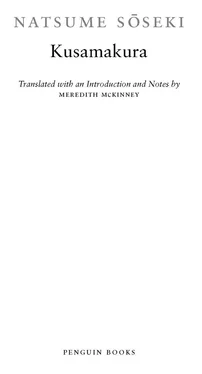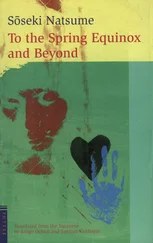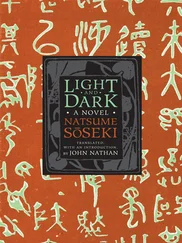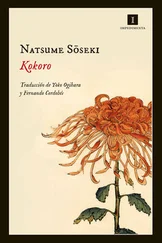Natsume Soseki - Kusamakura
Здесь есть возможность читать онлайн «Natsume Soseki - Kusamakura» весь текст электронной книги совершенно бесплатно (целиком полную версию без сокращений). В некоторых случаях можно слушать аудио, скачать через торрент в формате fb2 и присутствует краткое содержание. Жанр: Старинная литература, на английском языке. Описание произведения, (предисловие) а так же отзывы посетителей доступны на портале библиотеки ЛибКат.
- Название:Kusamakura
- Автор:
- Жанр:
- Год:неизвестен
- ISBN:нет данных
- Рейтинг книги:4 / 5. Голосов: 1
-
Избранное:Добавить в избранное
- Отзывы:
-
Ваша оценка:
- 80
- 1
- 2
- 3
- 4
- 5
Kusamakura: краткое содержание, описание и аннотация
Предлагаем к чтению аннотацию, описание, краткое содержание или предисловие (зависит от того, что написал сам автор книги «Kusamakura»). Если вы не нашли необходимую информацию о книге — напишите в комментариях, мы постараемся отыскать её.
Kusamakura — читать онлайн бесплатно полную книгу (весь текст) целиком
Ниже представлен текст книги, разбитый по страницам. Система сохранения места последней прочитанной страницы, позволяет с удобством читать онлайн бесплатно книгу «Kusamakura», без необходимости каждый раз заново искать на чём Вы остановились. Поставьте закладку, и сможете в любой момент перейти на страницу, на которой закончили чтение.
Интервал:
Закладка:
“No.â€
“Wel , why does she go there?â€
“She visits Mr. Daitetsu.â€
Ah yes, this must be the same Daitetsu who did the framed piece of cal igraphy above my door. To judge from its content, he’s clearly a Zen priest. That volume of Hakuin’s sermons in the cupboard, then, must be her personal property.
“Who normal y uses this room?â€
“The young mistress is normal y here.â€
“So she would have been here until I arrived last night?â€
“Yes.â€
“I’m sorry I’ve turned her out. So what does she go to Mr. Daitetsu’s place for?â€
“I don’t know.â€
“What else, then?â€
“Sorry?â€
“What else does she do?â€
“Um, various things . . .â€
“What sort of things?â€
“I don’t know.â€
The conversation comes to a halt. I finish my meal, and the maid withdraws the tray table.
When she slides open the door to leave, suddenly there beyond, on the second-floor balcony across the shrubs of the little inner garden, I see revealed the head of that same woman, under its ichogaeshi curves of hair. Her cheek rests elegantly upon a raised hand, and her gaze is directed downward like the enlightened figure of the “Wil ow Branch†Kannon bodhisattva. 4 In contrast to my earlier sight of her that morning, she now presents a deeply serene figure. Doubtless it’s because her face is lowered and her eyes do not so much as quiver in my direction that her features are transformed in this way. It used to be said that “the eye is the finest thing in the human form,â€5 and certainly its incomparably vivid expressiveness wil always shine through. Beneath the railing with its twisted patterning where she quietly leans, two butterflies flutter upward, now drawing together, now dancing apart.
Because my door has been opened suddenly, the woman swiftly raises her eyes from the butterflies toward my room. Her gaze pierces the air between us like a poisoned dart and fal s upon my brow without a flicker of recognition or greeting. Before I can recover from my astonishment, the maid has once more clapped the door shut, leaving behind her the easy-going indifference of spring.
I settle down to sprawl on the mat once more. The fol owing lines spring immediately to mind: Sadder than is the moon’s lost light,
Lost ere the kindling of dawn,
To travelers journeying on,
The shutting of thy fair face from my sight.6
Imagine that I have fal en in love with the figure I’ve just seen, and have determined to dedicate my life itself to achieving a meeting with her, only to be smitten at that very instant by such a parting glance as this, a glance that fil s my being with astonished delight or anguish. In that state I would undoubtedly have written just such sentiments in just such a poem as this. I might even have added the next two lines: Might I look on thee in death,
With bliss I would yield my breath.
Happily, I am by now wel past any susceptibility to the triteness of love and heartache, and I couldn’t become afflicted with such agonies even should I wish it. Yet these few lines are richly redolent with the poetry of the event that has just occurred. Though in fact no such painful longing binds me to the figure opposite, I find it amusing to project our relationship into the scene of this poem, and to apply the poem’s sentiments to our present situation. A thin karmic thread winds between us, linking us through something the poem holds that is true to this moment. But a karmic bond that consists of such a very tenuous thread is scarcely, after al , a burdensome matter. Nor is it any ordinary thread—it is like some rainbow arching in the sky, a mist that trails over the plain, a spider’s web glittering in the dew, a fragile thing that, though marvelously beautiful to the eye, must snap at the first touch. What if this thread were to swel before my eyes into the sturdy thickness of a rope? I wonder. But there’s no danger of this. I am an artist. And she is far from the common run of woman.
The door suddenly slides open again. I rol over to see, and there stands my karmic companion, poised on the threshold, bearing a tray that holds a green celadon bowl.
“You’re sleeping again, are you? I must have disturbed you last night. I do keep disturbing you, don’t I?†and she laughs. She shows not the least sign of shyness or concealment, let alone embarrassment. She has simply seized the initiative.
“Thank you for your help this morning,†I say again. This is the third time I’ve responded with a brief polite formula, I realize, and furthermore it has consisted each time simply of the words “thank you.â€
I am about to rise, but she swiftly seats herself on the floor beside me.
“Oh, don’t get up. We can talk as you lie there,†she says airily. That’s true enough, I think, and for the time being I content myself with rol ing over onto my stomach and lying chin in hands, elbows propped on the matting.
“I thought you must be bored, so I’ve made you some tea.â€
“Thank you.†There are those words again.
The plate of tea sweets contains some splendid slices of the firm bean jel y known as yokan Yokan happens to be my very favorite tea sweet.
Not that I particularly want to eat it, but that velvety, dense texture, with its semitranslucent glow, makes it a work of art by any standards. I especial y enjoy the sight of yokan that has a slightly blue-green sheen, like a mixture of gemstones and alabaster—and this bluish yokan piled on the plate glistens as if it has just this moment been born from within the celadon, so that my hand almost twitches with the urge to reach out and stroke it. No Western sweet gives this degree of pleasure. The color of cream is quite soft, I grant you, but it’s rather oppressive. Jel y looks at first sight like a jewel, but it trembles and lacks the weightiness of yokan. And as for those tiered pagodas of white sugar and milk, they’re simply execrable.
“Mmm, that looks splendid.â€
“Genbei has just brought it back from town. I imagine you’d be happy to eat something like this.â€
Genbei appears to have spent the night in town. I make no reply but simply continue to gaze at the yokan . I have no interest in who has brought it or from where—I’m more than happy simply to be registering a beautiful thing as beautiful.
“This celadon plate has a very fine shape. A wonderful color too. It’s scarcely inferior to the yokan ,†I remark.
She titters, and a faint, contemptuous smirk plays for a moment on her lips. She must have interpreted my words as intended to be clever.
Considered thus, my remark does indeed deserve to be despised—it’s exactly the kind of thing a stupid man wil come out with in a misguided attempt to sound sophisticated.
“Is it Chinese?â€
“What?†She isn’t aware of the plate at al .
“It certainly looks like it to me,†I say, lifting the plate to examine the inscription on its base.
“If you like this sort of thing, I can show you more.â€
“Yes, please do.â€
“My father loves antiques, so there are a lot of such things here. I’l tel him you’re interested, and you can have tea together sometime so he can show you.â€
I shrink a little at the mention of tea. No one is more tediously pompous than a tea ceremony master, who wil fancy himself the quintessence of elegant refinement. Your typical tea master is deeply conceited, not to mention affected and fastidious to a fault. He ostentatiously clings to the cramped little territory he’s marked out for himself within the wide world of sensibility, savoring his bowl of foam and bubbles with a quite ridiculous reverence. If that abominably complex set of rules and regulations that makes up the tea ceremony contains any refinement, then a crack army corps must positively reek of elegant sophistication! Al those “right about turn! quick march!†fel ows must to a man be the equivalent of the great tea masters. The art of the tea ceremony is something that the common merchant and townsman, lacking any education in the finer matters of taste, dreamed up through their ignorance of how refinement real y works, by mindlessly swal owing whole and in mechanical fashion the rules that were invented after Rikyu’s day.7 Their pitiful conviction that it constitutes the height of refinement only makes a mockery of true sensibility.
Читать дальшеИнтервал:
Закладка:
Похожие книги на «Kusamakura»
Представляем Вашему вниманию похожие книги на «Kusamakura» списком для выбора. Мы отобрали схожую по названию и смыслу литературу в надежде предоставить читателям больше вариантов отыскать новые, интересные, ещё непрочитанные произведения.
Обсуждение, отзывы о книге «Kusamakura» и просто собственные мнения читателей. Оставьте ваши комментарии, напишите, что Вы думаете о произведении, его смысле или главных героях. Укажите что конкретно понравилось, а что нет, и почему Вы так считаете.












